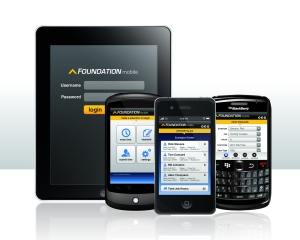 Mobile is a hot topic, and I thought that a practical view from someone who is dealing with contractors on a daily basis would be beneficial. Fred Ode is CEO/Chairman of Foundation Software, and they are the leading accounting software for contractors. Fred has written several articles and is known for his insight into this market. Here are some practical ways contractors should be using mobile. Enjoy.
Mobile is a hot topic, and I thought that a practical view from someone who is dealing with contractors on a daily basis would be beneficial. Fred Ode is CEO/Chairman of Foundation Software, and they are the leading accounting software for contractors. Fred has written several articles and is known for his insight into this market. Here are some practical ways contractors should be using mobile. Enjoy.
Guest post By Fred Ode, CEO/Chairman of Foundation Software
Stop where you are right now and look around. I bet there are at least two mobile devices in your vicinity. Depending on where you are—say a crowded street—there may be even more! This is the Mobile Age and many industries, including construction, are using this technology to improve their work processes.
So what types of mobile applications could benefit your construction business? One is a remote timecard entry.
Remote Timecard Entry
Contractors can now utilize remote timecard entry applications to streamline the flow of timecard and job data between the field and the office. Some other benefits of a remote timecard entry system are:
Less Double Entry, Fewer Errors. By entering time in the field, contractors can eliminate handwritten timecards (and the difficulty that comes with reading them!) Time is entered directly from the field in a digital format just once, and is then synced back to the office.
Data Defaults. Many apps have dropdown fields that already contain information pulled directly from the company’s accounting software like employee names, job codes, and more.
Multiple Timecard Formats. A good remote timecard entry app will offer multiple timecard formats, including single and group timecard options.
Benefits of Mobile Applications
When it comes down to it, the ultimate goal of any mobile app is to help contractors improve their processes across the board. Some of the benefits include:
Better Communication. Mobile devices can greatly improve communication between crew members. Workers on a large job site can instantly send one another updates, pictures and more.
Improved Workflow and Real-time Data. Along with communication, mobile devices also offer improved workflow and real-time data. Because communication is instant, there’s no waiting around to see if requests were approved or if the next steps can be taken.
Offline Capability. Some apps are equipped with offline capability, allowing contractors working in remote job locations to enter timecards, save them, and sync back to the office once they re-enter their service area.
Electronic Trail of Data. Using mobile applications also creates an electronic trail of data that contractors can reference at any time. Whether it’s solving an issue while a job is still active, or looking back at past jobs to better plan for future ones, the ability to save and learn from past data can only be beneficial.
Making the Move to Mobile
Remote timecard entry is just one of many helpful applications available to contractors. So where to begin with making a move into mobile? Start with a clear goal and thorough research. Find the options that will benefit the company and that have all the features they need. And don’t forget to get the end-users on board before starting the implementation process!
